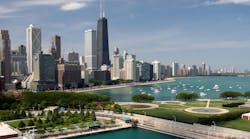According to a study released by Harris Interactive(SM), water quality issues and water availability are major concerns in the Eastern United States. The survey was conducted for Sears, Roebuck and Co. Results include
-- Overall (in all nine markets) 47 percent of respondents indicated their concerns about health-related contaminants, such as arsenic, lead, pesticides, bacteria, cysts (Cryptosporidium), etc.; in New York City, 61 percent have the same concerns.
-- Overall, 48 percent indicated they are concerned with the taste/odor, particularly chlorine.
-- In New York City, 90 percent of respondents said water availability is either a minor or major problem (59 percent said it is a major problem).
-- Respondents said they are actively taking steps to conserve water.
-- Overall, 63 percent of respondents are waiting to run their clothes washer until they have a full load; and 51 percent are doing the same with their dishwasher.
"As the preferred resource to outfit today's evolving home and family, Sears is committed to educating the public on important topics, such as energy and water conservation. This survey was commissioned as part of our consumer education campaign to help eliminate confusion around water- and energy- related issues," said Lyle Heidemann, executive vice president and general manager of hardlines for Sears.
Other Key Findings included
-- 64 percent of respondents said rebates were motivators for their purchase decisions when buying energy-efficient and water-saving appliances.
-- Which store comes to mind first when consumers think of buying an energy-efficient appliance? Overall, 53 percent said Sears; 16 percent said Best Buy; 6 percent said Home Depot; 5 percent said Lowe's and 3 percent said Wal-Mart.
-- 83 percent of respondents said they would be fairly likely (23 percent) or very likely (60 percent) to buy an energy-efficient appliance the next time they are in the market for an appliance.
-- Twenty-eight percent of respondents had purchased a newly constructed home; of those, however, only 4 percent were offered Energy Star appliances as an option by the builder. Energy Star, the national symbol for energy efficiency, was established in 1992 by EPA. With help from the U.S. Department of Energy, Energy Star is empowering consumers and businesses to protect the environment through energy efficiency.
"This study indicates the importance of understanding the options consumers have for improved water quality -- from water filters to reverse osmosis systems to the ultimate water purifier -- the Kenmore Deluxe Water Purifier, which is the only product of its kind that kills all microbiological contaminants. Consumers who are interested in conserving water can find high- efficiency washers like the Kenmore Elite HE3t or the new Kenmore SmartWash dishwasher and a variety of other leading brands at Sears," said Larry Costello, spokesperson for Sears.
For more information, visit www.harrisinteractive.com.
Source: PR Newswire

